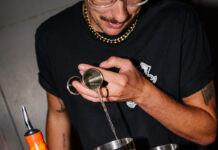The importance of clean glasses in venues is hard to overstate

IT was the late comedian Henny Youngman who once boasted about how his grandmother didn’t need glasses, even after her eightieth birthday, as she drank straight from the bottle.
Yet for the on-trade there are few things more important than glasses cleaned to a high standard, as poor glass washing can have a seriously detrimental effect on business, glasswasher suppliers told SLTN.
“For many, there’s nothing worse or more disappointing than ordering a glass of wine or refreshing cocktail for it to then be served in a smeared or stained glass,” said David Glover, UK and Ireland country manager at Wexiödisk.
“Poorly-cleaned glassware is one of the main reasons bartenders receive complaints, hence why it is paramount that glass washing is taken seriously by bar and restaurant operators.”
That point was underlined by Paul Crowley, marketing development manager at commercial warewasher supplier Winterhalter.
He said: “Customers don’t like dirty glasses – lipstick smears, spotting and lingering odours after washing are no-go areas and certainly don’t encourage repeat custom.
“In this age of social media, establishments cannot risk pictures of dirty glasses being posted online.”
For operators considering purchasing a new commercial glasswasher, technological advancements have been made in recent years that make the process more effective and cost efficient.
“The most energy efficient dishwashers save energy and use less water by using reverse osmosis water treatment,” said Paul Anderson, managing director at warewashing specialist Meiko.
“Reverse osmosis provides sparkling clean no-smear wash results, so staff do not need to hand-polish glasses.”
However, while the acquisition of a quality glasswasher can help licensees improve their overall results, it is not a silver bullet.
When considering which glasswasher to buy, Anderson stressed the importance of looking beyond the equipment to the supplier.
He said: “The glasswasher is one of the hardest working pieces of equipment in the bar; just watch the mayhem if it breaks down.
“It’s important to go with a leading brand, one who can advise on the best model for your situation, size of space, usage, etc.
“A good company can also provide you with a full breakdown of energy and water usage.
“Also, look for a company which has the best technical back up as if something does go wrong you need it fixed as soon as possible.”
When it comes to getting the maximum return and lifespan from an investment in a warewasher it is essential that they are properly maintained, stated Winterhalter’s Crowley.
“There is no reason why machines shouldn’t last ten years or more but it’s important to ensure a good cleaning regime, regular servicing and make sure that all their staff are well-trained on the equipment,” he said.
Establishments cannot risk pictures of dirty glasses being posted online.
“It is vital that the glasswasher is looked after properly.”
“Many sites only have one so if it stops working there is nothing to take its place.”
“This has a huge impact, adding stress and pressure to staff. Meaning all glasses will have to be washed by hand.”
To help guarantee glistening results, Glover at Wexiödisk advised licensees to use “high quality chemicals” during cleaning cycles.
And where glasses are kept before being used should also be given consideration, said Meiko’s Anderson, who advised operators to find an “odour-neutral” area to store clean glassware.
“Even when clean, the pores in the glass are quick to absorb smells from their surroundings,” he said.
“If you do not have an odour-neutral place to store your glassware, you should give it a quick rinse with water before use.”



















